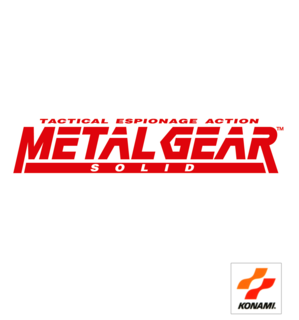Despite some huge writing issues, Metal Gear Solid is for the most part an intelligent, well-rounded action game.
Or maybe not. This has much to do with the fact that I didn't really get into gaming until the GameCube/Xbox/PS2 generation, but I have a difficult time appreciating games that were released earlier. On the one hand, I guess this excludes me from some reasonable enjoyment with these games; on the other, I also feel like I can take a look at these games without being jaded by nostalgia.
That said, Metal Gear Solid has held up remarkably well considering it was released in 1998. (For example, I'd suggest that it's aged much better than a contemporary competitor: Ocarina of Time.) The graphics are decent given they're more than ten years old, and the game does enough hand-holding to make it surprisingly playable.
That said, at a certain point the hand-holding just goes completely overboard. There are plenty of puzzles throughout the game, but they feel more optional than anything else because you can just phone in your support and they'll pretty much force feed you the answer. Again, this was obviously an attempt to make the game approachable and playable, but it strips Metal Gear Solid of much of its difficulty and depth.
This is disappointing, really, because in terms of the action Metal Gear Solid feels like a very intelligent action game. While you're given plenty of capable weaponry, there are enough enemies and they're difficult enough to kill that you're going to go out of your way to avoid confrontations. Which, after all, is how a steal game should work. (You should be taking notes here, Metal Gear Solid 4.) The game so works in the steal mechanic that when you are forced to engage enemies, the title feels awkward and generally un-fun.
That's not to say that Metal Gear Solid doesn't mix things up, because it does. Outside of the general sneaking that you'll do, there are other action-game-conventions here as well, including scaling down a wall, enduring torture (it's obvious that this is a pre-9/11 game. Political correctness, Kojima!), and fighting a bad guy that ought to have been dead two hours ago in a jeep. Fun stuff – but the most important part is that these segments never feel drawn out or overdone. They're thrown in there, they shake things up, and in a few minutes they're done. Metal Gear Solid takes itself very seriously, and with regards to gameplay the end result is for the most part positive.
It's probably worth noting that the pacing is a little off. The first half of the game proceeds as you would expect, working your way through the game, sneaking around guards, and taking on some (epic, amazingly cool) bosses. But the second half of the game cuts out the vast majority of the standard sneaking and feels sort of like Shadow of the Colossus, where you just make your way from one boss fight to another. I hesitated to bring this up only because it's not a bad thing; the bosses are the highlight of the game and getting to fight three or four in a just a few hours is certainly a treat.
But Metal Gear Solid is a walking contradiction, an enigma that revolves around the relationship between gameplay and plot. Actually, the problem isn't so much the plot, which is not that great but not that bad either, as it is the writing. For a game that is so self-aware as Metal Gear Solid, the writing is so consistently poor that the disparity between intelligent gameplay and massively stupid writing is just really, really puzzling.
When I want to save the game, I want to save the freaking game. I don't want to be subjected to a four-minute discussion on whether or not technology can explore the human soul. Snake has some really horribly-written lines that David Hayter's all-too-serious delivery makes even worse.
Metal Gear Solid's gameplay is good; the writing and by extension, to a point, so is the plot bad. Therefore, Metal Gear Solid is a game that should focus heavily on the gameplay, but Kojima in all his arrogance absolutely insists on pushing aside the gameplay mechanic to allow room for his pathetically overblown plot. Liquid and Metal Gear Rex will quietly stay out of the way so that Snake and his former friend can have an eight minute catch-up session. What the hell?
I mentioned that this disconnect between quality of gameplay and lack thereof of plot is puzzling; this isn't actually true. The problem is Hideo Kojima. He is arrogant and pretentious; he sees himself a visionary in the medium of video games but really only serves to cheapen their artistic value with really poor storytelling. And people point to this as a potentially pinnacle of video game plot? Seriously?
His name pops up on the box three or four times and another couple times on the disk. His development studio is named after him – Metal Gear Solid is a "Hideo Kojima Game" – and he's got his own nifty little icon with, of course, his name on it. And then his name pops up at least a dozen times during the credits, most conspicuously under Writing.
Is Metal Gear Solid a "bad" game? Not by any stretch of the imagination; for the most part it's an enjoyable, varied action game. It's held up well and you can get it along with Metal Gear Solids 2 and 3 for just thirty bucks. While it's probably worth playing just to see what all the fuss is about, you shouldn't expect a revolutionary, life-changing experience. The game is ridiculously short (I had no idea what I was doing and beat it in well under ten hours) and the entire experience is painfully tainted by Kojima's irrepressible ego.

